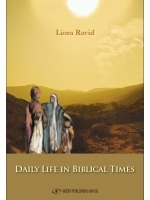 |
| ISBN 13: 9789652296092 Genfe Publishing House |
Why does the Bible support marriage to multiple wives? Why does only one son inherit his father’s property? Is it possible that the journey’s hardships and the severe shortage of food prevented Sarah from conceiving?
In The Bible Really Happened, Dr. Liora Ravid follows in the footsteps of the biblical heroes, examining their stories based on the social and legal reality of their time. The book reconstructs the historical journey of Abraham and his family from Ur of the Chaldees to the land of Canaan – from a land that worshiped multiple idols to the land of the One God, the birthplace of David, the judges, the prophets, and Jesus.
Ravid questions why the Bible begins with stories of the forefathers and foremothers, describing them as simple shepherds. Why were they so important? Ravid demonstrates that according to the pedigree in Genesis, the forefathers and foremothers originated from one noble family, the family that gave rise to King David, ancestor of the Messiah, and according to the New Testament, to Jesus as well.
Readers of the English Bible are often unaware of the special writing style of the original Hebrew, which uses rich wordplay and double entendre to add multiple layers of color and depth to the text. Especially for the non-Hebrew reader, the author opens a window on this hidden world within the words.
NOTE: It should be understood that daily life in Biblical Times was written by a native Israeli, Dr. Liora Ravid and published by a distinctively Jewish publishing house, (The Official Gefen Publishing House Website - One Stop Webstore for Jewish Books and Hebrew Studies Textbooks From Israel).Out of respect for our Christian school and upon our request, the author respectfully provided a copy of Daily Life in Biblical Times for our review.
Review: The last chapter of the book should be read first because it helps explain Ravid's Biblical position. She does believe that the Bible is true and not just oral legends passed down from generation to generation. Her book tries to give explanations to validate her viewpoint and refute Hermann Gunkel’s assertions in The Legends of Genesis. She clearly believes in the authenticity of the Bible. "No researcher, as bright as he may be, can separate God from Genesis, and argue that everything it says is untrue but that the existence of the God Who this book reveals is true." (p. 432)
However, Ravid does not believe that God is the author of the Bible who inspired the writers. She says that there are many authors "who wanted to emphasize and praise the wonders of the One God, not of human beings. Because they stood before the infinite greatness of God, they had no interest in elevating the figures about which they wrote, beyond the ordinary characteristics found in every human being. Thus despite the distance of time, we identify something deep about ourselves in these ancient stories--and this is the secret of their great attraction."
Because she believes human authors wrote it themselves to pass along the oral traditions through the educated class, she judges Biblical characters based on her bias. Their writings are open to omissions, additions, and other changes. For example, Joseph is described as being "spoiled" and "who had slandered his brothers to his father; his brothers' fury was justified. When the brothers come to Egypt wanting to buy food, Joseph mildly "mocked" them for not knowing him. In the end, the previously pampered boy "learned from his own travails the meaning of pity, the meaning of love, and the meaning of forgiveness." Ravid makes her own judgment based on human interpretation of human authors; she does not mention any inspiration of the Bible although she believes in the stories and characters.
Ravid's writings are easy to read. She includes interesting information on the geography and customs of the ancient lands, especially where it deals with women. However, I do not agree with many of her interpretations of the Biblical narrative. Therefore, I would not recommend this book for our library. It would be very confusing to a young audience. (Reviewed by M.Reynolds)
DISCLOSURE: A complimentary copy was provided by the author at our request for the purpose of this review. Opinions expressed are solely those of the reviewer. No compensation was provided for this review.
No comments:
Post a Comment
Your visit is important to us. Thank you for leaving a comment.